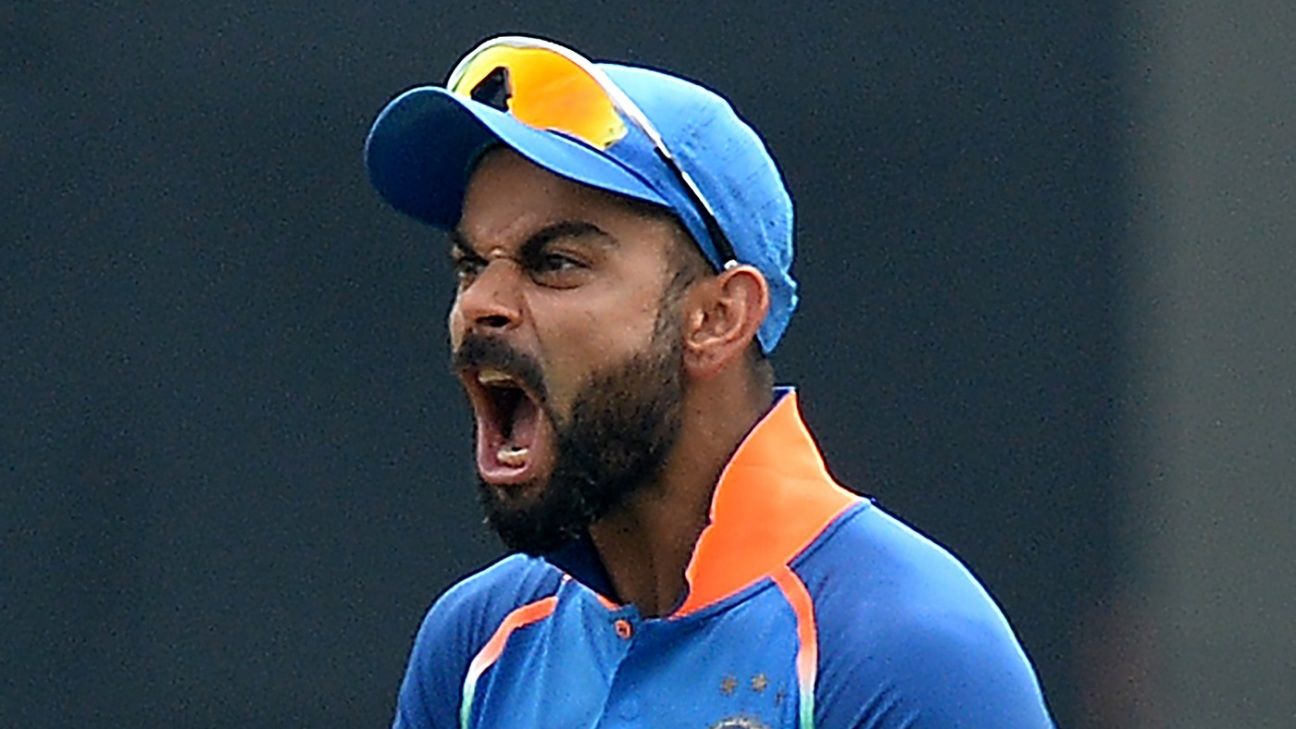India captain Virat Kohli has made it clear that he, and his side, will be drawing their own “line” about behaviour on their tour of Australia, and will not stand for conduct that goes against their “self-respect”.
“Aggression depends on the situation on the field. If the opposition is aggressive towards you, then you counter it,” Kohli said on the eve of the first T20I in Brisbane. “We have never been a team that started something, but we always draw a line at our self-respect. If we feel that someone is crossing that line, then we stand against it.
“But aggression can also mean how much effort you are putting in for each wicket as a team. Aggression is shown through your body language on the field, or for bowlers how long they can keep bowling in the same area. For batsmen, aggression can definitely be there in your body language, without saying a word or doing anything. For me, aggression is a passion for winning, and an obsession that I have to win every ball for my team. People have different meanings for aggression, but as far as I’m concerned, for me it is winning the match come what may, and giving 120% for my team every ball. Whether I’m on the field, or sitting outside and clapping for someone else, or batting, whatever it is.”
Kohli’s comments come, with the Australian team facing an uproar over their on-field behaviour, in the aftermath of the Newlands ball-tampering scandal that resulted in bans for Steven Smith, David Warner and Cameron Bancroft. In that series in South Africa where the scandal exploded, the first two Tests had been marked by heated exchanges between players even before the ball-tampering incident happened. At the time, the Australians had talked about the ‘line’ and how they always pushed it but never crossed it.
Kohli’s words could ignite the debate again, with the India captain firm that his team would have its own code.
Aaron Finch, the Australia captain, said that his team would focus more on being intense with their actions rather than words, echoing Kohli’s comments on aggression. “Going hard doesn’t mean being verbal or in people’s faces,” Finch said. “It can be about your body language, your presence at the crease, when you’ve got the ball in your hand. How you move around the field as a team, diving in the circle and cutting off ones. That’s presence and fierceness and that’s tough cricket. The verbal stuff’s the easy stuff, and that gets lost sometimes.
“We’re still as intense and desperate to win no doubt. It’s about going about that the right way and playing hard is part of the Australian way of doing it. For different people that means different things, it might be the intensity you go about it, it might be your body language. It’s not all about verbal and things like that, which people tend to get confused with sometimes. They talk about being tough and aggressive and that means verbal, but I don’t see it that way. It’s about your presence on the ground.”
On Monday, fast bowler Nathan Coulter-Nile had said that he hadn’t been sledged by India on the field, and that he, personally, wasn’t one to indulge in chatter on the field. “I’ve never been sledged by them,” he said. ” [In] T20 it’s a little bit hard to sledge, you don’t have that time in the field to really get angry, so I don’t think you’ll see too much of it during the T20s. I don’t talk to any of the batters personally, in T20s I don’t think people have too much to say. If they get an opportunity, I don’t think that’ll happen, it’ll just be talk with the ball, talk with the bat.”
